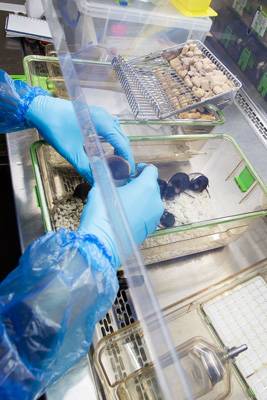
At UCL, we are committed to the highest standards of animal welfare. If a researcher believes that animal research is the only way to answer an important scientific question, they must first apply for internal ethical approval. No scientific procedure can be undertaken if there are non-animal alternatives available to answer the same question or if it may cause unnecessary harm to the animals. Applications are considered by the institution's Animal Welfare and Ethical Review Body (AWERB), a committee that can include members of the public, veterinary surgeons, researchers and animal facility staff. If a project receives AWERB approval, an application is submitted to the Home Office who grant the licence.
The AWERBs
Each site that conducts animal research requires a licence and corresponding AWERB to advise and oversee the establishment licence holder. UCL has an establishment licence covering the following locations:
An AWERB at each location oversees animal research at the site, with responsibilities for safeguarding welfare. The core responsibilities of AWERBs, as set out by the Home Office, are as follows:
- Advise staff dealing with animals on matters related to the welfare of the animals, in relation to their acquisition, accommodation, care and use
- Advise on the application of the '3Rs': replacing, reducing and refining the use of animals in research where possible
- Establish and review processes for monitoring, reporting and following up matters relating to animal welfare
- Review projects carried out in the establishment, taking into account the effect on the animals used, identifying and advising on elements that could further contribute to the 3Rs
- Advise on re-homing schemes, including the appropriate socialisation of the animals to be re-homed
AWERBs may also be asked to:
- Consider proposals for animal research projects and advise the licence holder whether or not to submit them to the Home Office for approval
- Assist with retrospective reviews of animal work, responding to enquiries and considering advice from the Home Office Animals in Science Committee
- Promote awareness of animal welfare and the principles of the 3Rs
- Provide a forum for discussion and development of ethical advice on all matters related to animal welfare, care and use
- Support staff dealing with animals with guidance on animal welfare, ethical issues and appropriate training
- Help to promote a culture of care within the establishment and in the wider community
Each AWERB oversees the establishment's use of animals for research, encouraging the highest standards of animal welfare. On the ground, Named Animal Care and Welfare Officers (NACWOs) and Named Veterinary Surgeons (NVSs) check that all animals are well cared-for.
The NACWOs and NVSs
NACWOs and NVSs are responsible for the care and welfare of animals used in research. They manage the staff and equipment at animal facilities, striving to ensure that the animals receive the best possible care at all times. If staff have any concerns about animal welfare, they are encouraged to immediately raise these with the NACWO, a policy of 'if you see something, say something'. Staff are trained to look out for signs of distress or discomfort in animals and to report these immediately. The mouse grimace scale, developed to detect signs of distress in mice, is prominently displayed around UCL facilities to help staff look out for such signs.
Animal facilities at UCL are staffed by teams of dedicated trained animal technologists. Along with the licence holders, they are responsible for the care and welfare of laboratory animals and their environments. All UCL staff and students who need to work with animals receive rigorous training. They are only allowed to work with animals when the NACWO is satisfied that they can do so with care and compassion.
UCL Biological Services
Laboratory animals, and associated facilities and services are provided by UCL Biological Services. Distributed across 10 Biological Services Units (BSUs), the department also provides training, assessment of competence, advice and technical assistance through its trained staff.
Named Animal Care and Welfare Officers (NACWOs), provide day-to-day oversight of husbandry, care and welfare of animals held in the BSUs.
Named Veterinary Surgeons (NVSs) monitor and provide advice on the health, welfare and treatment of animals related to the research programmes.
Biological Services works together with researchers in aiming for the highest standards in animal care and welfare, and supporting the research goals of UCL. Biological Services staff are specialists in laboratory animal care. As such, they have a great empathy for the animals under their care. Many Biological Services staff are also Home Office personal licence holders. This means that they are able to provide expert technical advice and assistance to research groups.
It has long been acknowledged that good science goes hand in hand with good animal husbandry and welfare practices. Great attention is given to the provision of accommodation, such that the environment, housing, freedom of movement, food, water and care provided for each animal as well as its social structure are appropriate for its health and well-being. Therefore, the caging and husbandry routines are designed not only to provide adequate space and minimise stress, but also to reduce the risk of infection. A variety of environmental enrichments is provided to all cages, not only to provide stimuli to the animals but also, in the case of rodents, to facilitate their natural behaviours.
 Close
Close

